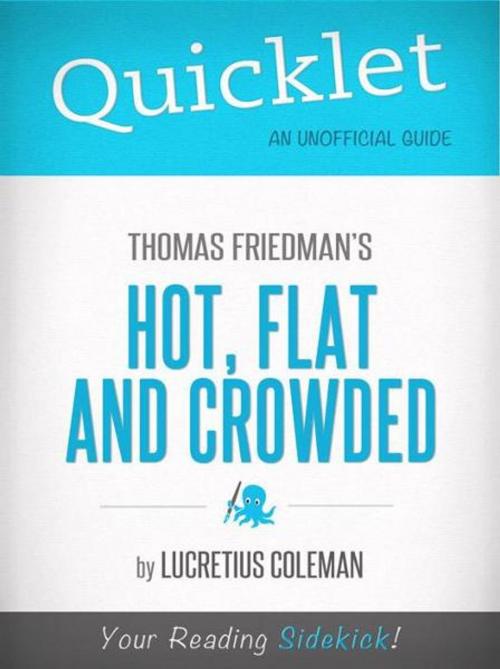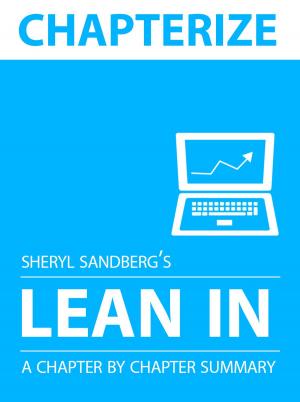Quicklet on Thomas Friedman's Hot, Flat and Crowded (Cliffsnotes-Like Book Summary and Analysis)
Business & Finance, Economics, International Economics, Nonfiction, Reference & Language, Study Aids| Author: | Lucretius Coleman | ISBN: | 9781614644088 |
| Publisher: | Hyperink | Publication: | March 5, 2012 |
| Imprint: | Language: | English |
| Author: | Lucretius Coleman |
| ISBN: | 9781614644088 |
| Publisher: | Hyperink |
| Publication: | March 5, 2012 |
| Imprint: | |
| Language: | English |
Quicklets: Your Reading Sidekick!
This Hyperink Quicklet includes an overall summary, chapter commentary, key characters, literary themes, fun trivia, and recommended related readings.
ABOUT THE BOOK
Hot, Flat, and Crowded: Why We Need a Green Revolution and How it Can Renew America, is the follow-up and companion piece to his 2005 bestseller The World is Flat.: A Brief History of the Twenty-First Century. In it he takes themes developed in The World is Flat the flattening of the world by means of the personal computer, internet, and the software that both share and applies it to the burgeoning Green movement. Published in 2008, it sharply critiques Americas stance on the environmental impact of its massive consumption of energy and how the world as a whole is following Americas wasteful lead.
Friedman uses his experience and analytical eye as a foreign affairs columnist with The New York Times to further examine the political impact of the Wests love affair with Middle Eastern oil.
He uses this analysis to draw correlations between oil markets and the democracy of oil-producing countries. He describes how a hotter, more crowded world with a more level playing field has combined to create a system where American-style appetites for energy continue to grow worldwide, threatening biodiversity and the development for new, cleaner energy technologies.
MEET THE AUTHOR
Lucretius Coleman is a writer, physicist, husband, father, and curmudgeon. He hopes to build the world's first practical quantum computer when not busy writing the next Great American Novels. He loves it when science, technology, and pop culture intersect to create the Eureka! moments that drive the world's greatness. When not making fun of his wife's affinity for trashy romance, Lucretius spends his time reading comic books and watching The Real Housewives of Atlanta.
EXCERPT FROM THE BOOK
Americas place in the worlds environmental landscape is one of leadership, but not in a good way. Were resource hoggers and gas guzzlers, coal shovelers and oil junkies. While we remain firmly entrenched as the worlds economic, political, scientific, and engineering leader, Americas moral and ethical absence of a strong and coherent environmental policy threatens that dominance.
Indeed, it threatens the globe.
In a fluid world where innovation is at a shortage, America finds itself lacking. Americans talk about going Green but refuse to live it.
In a world where 9/11 is only a memory away, and proud servicemen and women remain vigilant against the forces of terrorism and extremism, we continue to fund the enemy by sending dollars to the Middle East.
In a world where growing populations strive to emulate the plush middle-class lifestyles Americans now take for granted, we continue to serve as a bad example in the areas of consumption and conservation.
Buy a copy to keep reading!
Quicklets: Your Reading Sidekick!
This Hyperink Quicklet includes an overall summary, chapter commentary, key characters, literary themes, fun trivia, and recommended related readings.
ABOUT THE BOOK
Hot, Flat, and Crowded: Why We Need a Green Revolution and How it Can Renew America, is the follow-up and companion piece to his 2005 bestseller The World is Flat.: A Brief History of the Twenty-First Century. In it he takes themes developed in The World is Flat the flattening of the world by means of the personal computer, internet, and the software that both share and applies it to the burgeoning Green movement. Published in 2008, it sharply critiques Americas stance on the environmental impact of its massive consumption of energy and how the world as a whole is following Americas wasteful lead.
Friedman uses his experience and analytical eye as a foreign affairs columnist with The New York Times to further examine the political impact of the Wests love affair with Middle Eastern oil.
He uses this analysis to draw correlations between oil markets and the democracy of oil-producing countries. He describes how a hotter, more crowded world with a more level playing field has combined to create a system where American-style appetites for energy continue to grow worldwide, threatening biodiversity and the development for new, cleaner energy technologies.
MEET THE AUTHOR
Lucretius Coleman is a writer, physicist, husband, father, and curmudgeon. He hopes to build the world's first practical quantum computer when not busy writing the next Great American Novels. He loves it when science, technology, and pop culture intersect to create the Eureka! moments that drive the world's greatness. When not making fun of his wife's affinity for trashy romance, Lucretius spends his time reading comic books and watching The Real Housewives of Atlanta.
EXCERPT FROM THE BOOK
Americas place in the worlds environmental landscape is one of leadership, but not in a good way. Were resource hoggers and gas guzzlers, coal shovelers and oil junkies. While we remain firmly entrenched as the worlds economic, political, scientific, and engineering leader, Americas moral and ethical absence of a strong and coherent environmental policy threatens that dominance.
Indeed, it threatens the globe.
In a fluid world where innovation is at a shortage, America finds itself lacking. Americans talk about going Green but refuse to live it.
In a world where 9/11 is only a memory away, and proud servicemen and women remain vigilant against the forces of terrorism and extremism, we continue to fund the enemy by sending dollars to the Middle East.
In a world where growing populations strive to emulate the plush middle-class lifestyles Americans now take for granted, we continue to serve as a bad example in the areas of consumption and conservation.
Buy a copy to keep reading!















